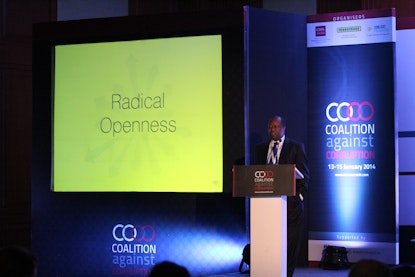Open to Fight Corruption in Contracting

Open contracting is central to the fight against corruption.
That was one of the key outcomes which emerged from the Coalition Against Corruption (CoCo) Summit, which took place in Bangalore, India in January.
An estimated 9.5 trillion dollars are spent every year by governments around the world through contracts. Yet, public contracting is one of the areas most vulnerable to corruption, inefficiency, and mismanagement.
Contracting that is more transparent and participatory can result in measurable positive impacts for citizens, private sector and governments.
A new norm of “radical openness” in public contracting can have a significant impact in fostering socially-inclusive economic development, according to Robert Hunja, the World Bank’s Open Government manager and a member of the Open Contracting Partnership.
Yet, there are many challenges in India, and in countries all around the world, to ensuring that contracts lead to the outcomes that they should, as explained by Vinod Rai, former Comptroller and Auditor General of India.
At the CoCo Summit, Mr. Rai spoke about the different models of corruption that have negatively impacted India. He gave the example of infrastructure contracts for which concessions are awarded after the approval of the contract.
Crony-capitalism – through which contracts are awarded to friends or close contacts – have traditionally also promoted corruption in India, according to Mr. Rai. Even “if the cronies deliver, it is still not right”, he said.
Nonetheless, both in India and elsewhere, a positive change has begun to occur. Emerging trends, according to Mr. Hunja, include the use of technology for increased transparency and participation, the demystification of contracting, and a growing citizen demand for increased openness.
61% of 65,000 citizens surveyed across 62 countries, including India, said that they would like their government to be more open, according to the World Bank’s Open Government Practice.
 The Global Opening Government Survey, conducted by the World Bank’s Open Government Practice and the RIWI Corporation, surveyed citizens in 62 countries also shows that 63% of those surveyed in India think that citizens should have a say in government contracting and spending.
The Global Opening Government Survey, conducted by the World Bank’s Open Government Practice and the RIWI Corporation, surveyed citizens in 62 countries also shows that 63% of those surveyed in India think that citizens should have a say in government contracting and spending.
Similarly, 69% of those surveyed in India, said that they thought that if their government were more open it would be more effective.
For citizens to be able to fully participate in public contracting processes, it is essential to ensure that contract information isn’t simply contained in hundreds of pages within archival rooms in government offices. Rather, open contracting data can serve as the foundation of effective citizen participation.
Discussing the example of Georgia, Mathias Huter from Transparency International, explained the progress that has been achieved through the establishment of a national e-procurement platform.
The platform serves to increase transparency around contracting processes, but also allows for thorough analysis about the way in which public contracting takes place in Georgia.
There are a growing number of e-procurement portals, in sub-national environments, such as in the case of the government of Kanartaka, as well as in national environments, like in the case of the government of Colombia.
As an increasing number of governments look to publishing contracting information in open data format, standards and guidance for disclosure of contract data is crucial.
It was announced that the Open Contracting Partnership, collaborating with the World Wide Web Foundation, has begun the creation of an Open Contracting Data Standard looking to serve as a guide for governments and institutions seeking to release contracting data.
The Open Contracting Data Standard, which will be developed through a collaborative process in the next 14 months, will also include sectoral adaptations for contracts in the extractives and land sectors.
While web-based and mobile-based technologies can play a crucial role in enhancing transparency and citizen participation around contracting processes, it is estimated that 65% of the world population is offline.
To truly make contracting open, it is important to use tactics and approaches that are as inclusive as possible, mixing both technological and non-technological techniques, by analyzing what is most appropriate for each context.
Ultimately, Mr. Hunja, concluded, “contracting that is more open can improve the everyday lives of citizens around the world.”